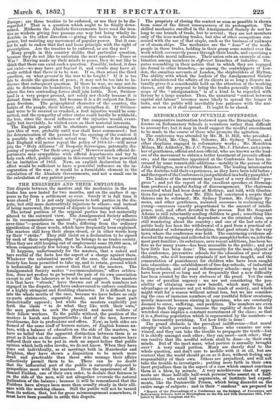THE ENGINEERS AND THEIR EMPLOYERS.
THE dispute between the masters and the mechanics in the iron trades has now lasted for two months, and on the surface it ap- pears as far from a settlement as ever. Surely it is full time it were closed? It is not only injurious to both parties in the dis- pute, but still more destructively injurious to others; and instead of being narrowed, the ground of dispute is becoming widened.
The actual position of the original parties has not materially altered to the outward view. The Amalgamated Society adheres to its recommendations against "piece-work" and "systematic over-time "—practices in the trade, differing from the ordinary signification of those words, which have frequently been explained. The masters still keep their shops closed, or in other words keep up their "strike." They still insist on a declaration to be signed by each of their workpeople, that he belongs to no trades society. Thus they are still keeping out of employment some 20,000 men, of whom comparatively few belong to the Amalgamated Society.
It happens unfortunately for the masters that a naked and bare recital of the facts has the aspect of a masters, against them. Whatever the substantial merits of the case, the Amalgamated Society has been permitted to take up, and to retain, ground which is technically far more correct than that of the masters. The Amalgamated Society makes "recommendations," offers arbitra- tion, does not profess to go beyond the pale of its own association except to aid the labourers or to ask moral support. The masters it is that have "struck," have thrown out of work numbers not d in the dispute, and have endeavoured to enforce conditions of a highly stringent and disabling character. It is difficult to go into the whole merits of the case, because we have before us only ex-parte statements, separately made, and for the most part diametrically opposed ; but while the masters explicitly put forth the claim " to do what they like with their own," the men profess to seek the physical and moral welfare of their fellow workers. To the public without, the position of the masters is harsh and impracticable ; that of the men, however troublesome fa in professions and eters. Now, as both sides are fbrmed of the same stuff of human nature, of English human na- ture, with a balance of education on the side of the masters, we have no belief that the apparent distinction between them is so great as it looks on the surface. How it is that the masters have suffered their ease to be put in such an aspect before that public Opinion which both sides invoke, we do not know. When they have dome out individually, as at meetings both in Manchester and Brighton, they have shown a disposition to be much more frank and practicable than those who manage their affairs collectively permit them to be. There can be no doubt that the influential part of the public is naturally disposed to sympathize most with the masters. Even the appearance of Mr. Samuel Fielden' one of their own order, to declare that fairness is on the side of the men, will not altogether overrule the natural inclination of the balance ; because it will be remembered that the Rieldens have always been. more than usually steady in their alli- anoe with the working classes. Still the public will not be turned from its notion, that, but for gross mismanagement somewhere, it must have been possible to settle this dispute. The propriety of closing the contest as soon as possible is shown from some of the direct consequences of its prolongation. The skilled mechanics enrolled in the Amalgamated Society do not be- long to one branch of trade, but to several; they are not members only of the iron-working trades, but also of other occupations con- nected with the use of that staple, such as the business of railways or of steam-ships. The mechanics are the " dons " of the work- people in those trades, holding in their grasp some control over the work which necessarily passes through their hands, and exercising a considerable moral influence. Their union sets an example of com- bination among members in different branches of industry. Dis- putes resembling in their nature that in which they are engaged are found in other branches,—as among the coalwhippers of Lon- don, the omnibus servants of London, the shipbuilders of Hylton. The ability with which the leaders of the Amalgamated Society have administered the affairs of its clients in so long a dispute na- turally gives it a considerable hold on the attention of the working classes, and the proposal to bring the trades generally within the scope of the " amalgamation " is of a kind to be regarded with favour by a large number. Thus, the unnatural "contest between capital and labour" becomes more likely to spread the longer it lasts, and the public will inevitably lose patience with the nui- sance as soon as it shall spread. It ought to be dosed.


























 Previous page
Previous page